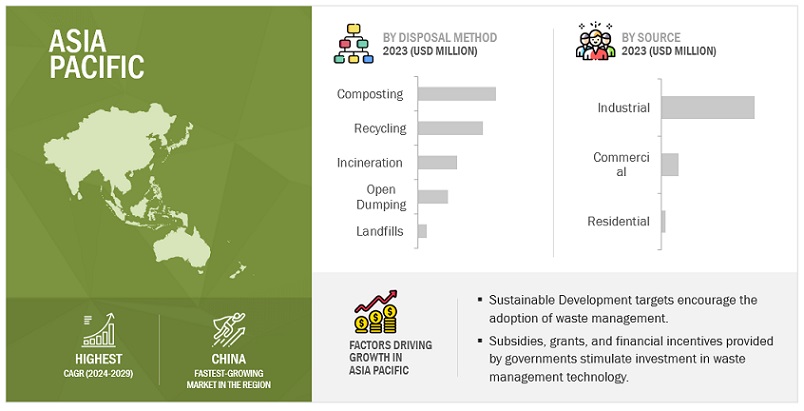
New Revenue Pockets:
The Global Waste Management Market is projected to reach USD 1598.1 billion by 2029 from an estimated USD 1219.6 billion in 2024, at a CAGR of 5.6% during the forecast period. Proactive government measures to reduce illegal waste disposal, technological advancements in waste processing and recycling, and the rising generation of e-waste globally is leading to increase in waste management market.
Key Market Players
Prominent companies in this market include WM Intellectual Property Holdings, L.L.C. (US), Suez (France), Veolia (France), Republic Services (US) & Waste Connections (US) are the market leaders in the Waste management market.
Download PDF Brochure: https://www.marketsandmarkets.com/pdfdownloadNew.asp?id=72285482
This report segments the waste management market based on waste type into six categories: Hazardous Waste, E-Waste, Municipal Solid Waste, Medical Waste, Construction & Demolition, Non-Hazardous Industrial waste. The Non-Hazardous Industrial waste Waste managements segment is expected to be the fastest-growing segment. Factors such as expanding oil production, rising municipal solid trash per capita, rising construction activity, economic expansion, and an aging population are major drivers of market growth for non-hazardous waste management services. Additionally, developments such as vertical integration, expanding commercial franchise zones, outsourcing, greater governmental support, and rising demand for environmental services all have a significant impact on the growth of non-hazardous waste management services.

Based on, the disposal method, waste management market is segmented into five categories: Open Dumping, Incineration/Combustion, Landfill, Recycling, Composting & Anaerobic Digestion. The Landfill waste management segment is expected to be the largest segment during the forecast period. Landfills effectively manage non-hazardous solid waste by disposing of non-recyclable garbage. Modern landfills are well-engineered and can handle numerous waste types, making them prominent in the waste management business. Furthermore, the growing population and large solid waste generation, particularly from residential sources, boost need for waste management services, which frequently end up in landfills. Additionally, the residential segment contributes heavily to garbage generation, with families producing a variety of waste that frequently ends up in landfills, underscoring landfills’ role in the waste management business.
This research report categorizes the Waste management Market by Waste type, Disposal method, Source and Region.
On the basis of Waste type:
- Hazardous Waste
- E-Waste
- Municipal Solid Waste
- Medical Waste
- Construction & Demolition Waste
- Non- Hazardous Industrial Waste
On the basis of Disposal method:
- Open Dumping
- Incineration/Combustion
- Landfill
- Recycling
- Composting & Anaerobic Digestion
On the basis of Source:
- Residential
- Commercial
- Industrial
Based on region:
- North America
- Europe
- Asia Pacific
- Middle East & Africa
- Latin America
Request Sample Pages: https://www.marketsandmarkets.com/requestsampleNew.asp?id=72285482
This report segments waste management market based on source type into three categories: Residential, Commercial & Industrial source. The commercial segment is expected to be the second largest segment by source during the forecast period. It includes physical pickup and transfer of waste produced by businesses to a place where it can be treated or disposed of. Schools, offices, hotels and restaurants, stores, hospitals, prisons, and government centers fall under this category. The segment covers waste in the form of appliances, crockery products, FMCG products, stationery, consumer durables, and packaging materials. The waste management market in this sector is projected to witness moderate growth due to rapid urbanization and the booming hospitality sector. The recycling of commercial waste includes collection, sorting, and recycling of waste, which can be done either by a municipality or a private recycling firm.


